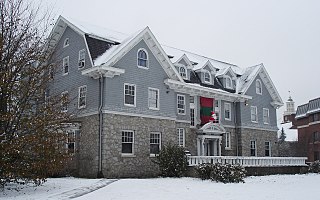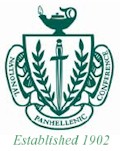
North American fraternity and sorority housing refers largely to the houses or housing areas in which fraternity and sorority members live and work together. In addition to serving as housing, fraternity and sorority housing may also serve to host social gatherings, meetings, and functions that benefit the community.
Dartmouth College is host to many fraternities and sororities, and a significant percentage of the undergraduate student body is active in Greek life. In the fall of 2022, 35 percent of male students belong to a fraternity and 36 percent of students belong to a sorority. Greek organizations at Dartmouth provide both social and residential opportunities for students and are the only single-sex residential option on campus. Greek organizations at Dartmouth do not provide dining options, as regular meal service has been banned in Greek houses since 1909.

Phi Tau (ΦΤ) is a coeducational fraternity at Dartmouth College in Hanover, New Hampshire, USA. Founded in 1905 as the Tau chapter of Phi Sigma Kappa, the organization separated from the national fraternity in 1956 over a dispute regarding the segregationist membership policies of the national organization. The fraternity renamed itself Phi Tau Fraternity, and in 1972 became the first fraternity at Dartmouth to admit women student members. Today, Phi Tau Coeducational Fraternity is one of only three remaining, officially recognized coeducational Greek organizations on the Dartmouth College campus.

The National Panhellenic Conference (NPC) is an umbrella organization for 26 national and international women's sororities throughout the United States and Canada. Panhellenic refers to the group's members being autonomous social Greek-letter societies of college women and alumnae.

Kappa Kappa Gamma (ΚΚΓ), also known simply as Kappa or KKG, is a collegiate sorority founded at Monmouth College in Monmouth, Illinois, United States.
Professional fraternities, in the North American fraternity system, are organizations whose primary purpose is to promote the interests of a particular profession and whose membership is restricted to students in that particular field of professional education or study. This may be contrasted with service fraternities and sororities, whose primary purpose is community service, and social fraternities and sororities, whose primary purposes are generally aimed towards some other aspect, such as the development of character, friendship, leadership, or literary ability.

Sigma Kappa is a sorority founded on November 9, 1874 at Colby College in Waterville, Maine.
Cultural interest fraternities and sororities, in the North American student fraternity and sorority system, refer to general, social organizations oriented to students having a special interest in a culture or cultural identity.
While most of the traditional women's fraternities or sororities were founded decades before the start of the 20th century, the first ever specifically Christian-themed Greek Letter Organization formed was the Kappa Phi Club, founded in Kansas in 1916. Kappa Phi was a women's sisterhood that developed out of a bible study and remains one of the largest nationally present Christian women's collegiate clubs today. Later organizations added more defined social programming along with a Christian emphasis, bridging the gap between non-secular traditional sororities and church-sponsored bible study groups, campus ministries and sect-based clubs and study groups.

Kappa Sigma (ΚΣ), commonly known as Kappa Sig or KSig, is an American collegiate social fraternity founded at the University of Virginia in 1869. Kappa Sigma is one of the five largest international fraternities with currently 318 active chapters and colonies in North America. Its endowment fund, founded in 1919, has donated more than $5 million to undergrads since 1948. In 2012 alone, the Fraternity's endowment fund raised over $1 million in donations.
The North American fraternity and sorority system began with students who wanted to meet secretly, usually for discussions and debates not thought appropriate by the faculty of their schools. Today they are used as social, professional, and honorary groups that promote varied combinations of community service, leadership, and academic achievement.
The expansion of Greek letter organizations into Canada was an important stage of the North American fraternity movement, beginning in 1879 with the establishment of a chapter of Zeta Psi at the University of Toronto. In 1883, the same fraternity established a chapter at McGill University. Other early foundations were Kappa Alpha Society at Toronto in 1892 and at McGill in 1899, and Alpha Delta Phi at Toronto in 1893 and at McGill in 1897. The first sorority, Kappa Alpha Theta, was established in Toronto in 1887. In 1902, the first international chapter of Phi Delta Theta was established at McGill University as the Quebec Alpha.

Washington & Jefferson College is host to 8 Greek organizations and a significant percentage of the undergraduate student body is active in Greek life. With 43% of women and 40% of men of the student body participating in "greek life," fraternities and sororities play a significant role in student life at W&J. The Princeton Review named Washington & Jefferson College 12th on their 2010 list of "Major Frat and Sorority Scene" in the United States. As of 2024, the Office of Fraternity & Sorority Life recognized 4 fraternities, Alpha Tau Omega, Beta Theta Pi, Delta Tau Delta, and Phi Kappa Psi, and 4 sororities, Delta Gamma, Kappa Alpha Theta, Kappa Kappa Gamma, and Pi Beta Phi. The fraternities are governed by a local Interfraternal Council and the sororities are governed by a local Panhellenic Council, while the Greek Judiciary manages broad policy violations at the chapter-level. All Greek organizations occupy College-owned houses on Chestnut Street on campus. All members of fraternities and sororities must pay the $100 "Greek Membership Fee," a levy designed to fund leadership seminars and other educational events for Greeks.

Fraternities and sororities at the University of Virginia include the collegiate organizations on the grounds of the University of Virginia in Charlottesville, Virginia. First founded in the 1850s with the establishment of several fraternities, the system has since expanded to include sororities, professional organizations, service fraternities, honor fraternities, and cultural organizations. Fraternities and sororities have been significant to the history of the University of Virginia, including the founding of two national fraternities Kappa Sigma (ΚΣ) and Pi Kappa Alpha (ΠΚΑ).
In North America, fraternities and sororities are social clubs at colleges and universities. They are sometimes collectively referred to as Greek life or Greek-letter organizations, as well as collegiate fraternities or collegiate sororities to differentiate them from traditional not (exclusively) university-based fraternal organizations and fraternal orders that have historically acted as friendly societies or benefit societies to certain groups unlike the ones mentioned in this article.

Kappa Phi Kappa (ΚΦΚ) is an American professional fraternity for students in education. It was organized in 1922 at Dartmouth College. It currently has one active chapter at Ohio State University.

Bones Gate ("BG") is a local fraternal organization at Dartmouth College, an Ivy League university in Hanover, New Hampshire, United States. Originally founded in 1901 as the Gamma Gamma chapter of Delta Tau Delta, the fraternity disassociated from the national organization in 1960 and went unnamed until 1962 when it became Bones Gate—the name of a pub frequented by some of its members while studying abroad in England.












